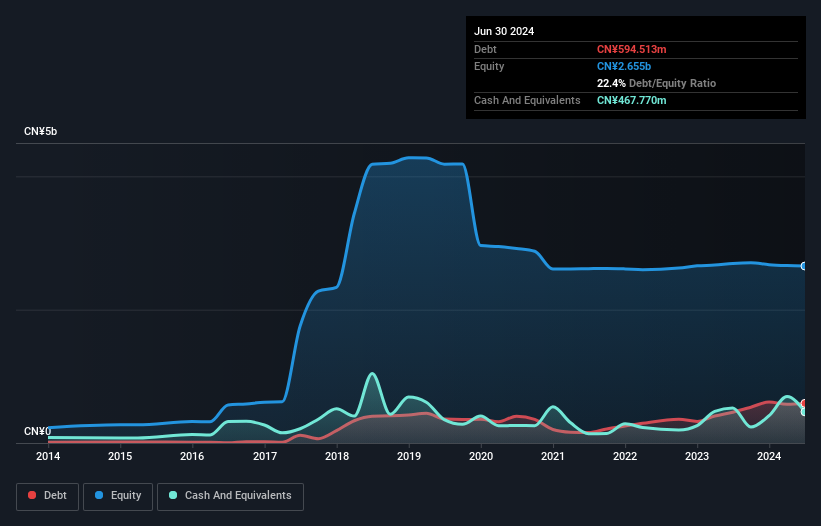We Think JILIN JINGUAN ELECTRICLtd (SZSE:300510) Has A Fair Chunk Of Debt
The external fund manager backed by Berkshire Hathaway's Charlie Munger, Li Lu, makes no bones about it when he says 'The biggest investment risk is not the volatility of prices, but whether you will suffer a permanent loss of capital.' It's only natural to consider a company's balance sheet when you examine how risky it is, since debt is often involved when a business collapses. We note that JILIN JINGUAN ELECTRIC Co.,Ltd (SZSE:300510) does have debt on its balance sheet. But the real question is whether this debt is making the company risky.
When Is Debt A Problem?
Debt is a tool to help businesses grow, but if a business is incapable of paying off its lenders, then it exists at their mercy. Part and parcel of capitalism is the process of 'creative destruction' where failed businesses are mercilessly liquidated by their bankers. However, a more usual (but still expensive) situation is where a company must dilute shareholders at a cheap share price simply to get debt under control. Having said that, the most common situation is where a company manages its debt reasonably well - and to its own advantage. When we think about a company's use of debt, we first look at cash and debt together.
Check out our latest analysis for JILIN JINGUAN ELECTRICLtd
What Is JILIN JINGUAN ELECTRICLtd's Debt?
As you can see below, at the end of June 2024, JILIN JINGUAN ELECTRICLtd had CN¥594.5m of debt, up from CN¥462.1m a year ago. Click the image for more detail. On the flip side, it has CN¥467.8m in cash leading to net debt of about CN¥126.7m.

How Healthy Is JILIN JINGUAN ELECTRICLtd's Balance Sheet?
Zooming in on the latest balance sheet data, we can see that JILIN JINGUAN ELECTRICLtd had liabilities of CN¥975.0m due within 12 months and liabilities of CN¥152.4m due beyond that. On the other hand, it had cash of CN¥467.8m and CN¥1.25b worth of receivables due within a year. So it can boast CN¥593.0m more liquid assets than total liabilities.
It's good to see that JILIN JINGUAN ELECTRICLtd has plenty of liquidity on its balance sheet, suggesting conservative management of liabilities. Because it has plenty of assets, it is unlikely to have trouble with its lenders. When analysing debt levels, the balance sheet is the obvious place to start. But it is JILIN JINGUAN ELECTRICLtd's earnings that will influence how the balance sheet holds up in the future. So when considering debt, it's definitely worth looking at the earnings trend. Click here for an interactive snapshot.
In the last year JILIN JINGUAN ELECTRICLtd wasn't profitable at an EBIT level, but managed to grow its revenue by 9.4%, to CN¥1.3b. That rate of growth is a bit slow for our taste, but it takes all types to make a world.
Caveat Emptor
Over the last twelve months JILIN JINGUAN ELECTRICLtd produced an earnings before interest and tax (EBIT) loss. Indeed, it lost CN¥48m at the EBIT level. Looking on the brighter side, the business has adequate liquid assets, which give it time to grow and develop before its debt becomes a near-term issue. Still, we'd be more encouraged to study the business in depth if it already had some free cash flow. So it seems too risky for our taste. The balance sheet is clearly the area to focus on when you are analysing debt. But ultimately, every company can contain risks that exist outside of the balance sheet. Case in point: We've spotted 1 warning sign for JILIN JINGUAN ELECTRICLtd you should be aware of.
Of course, if you're the type of investor who prefers buying stocks without the burden of debt, then don't hesitate to discover our exclusive list of net cash growth stocks, today.
Have feedback on this article? Concerned about the content? Get in touch with us directly. Alternatively, email editorial-team (at) simplywallst.com.
This article by Simply Wall St is general in nature. We provide commentary based on historical data and analyst forecasts only using an unbiased methodology and our articles are not intended to be financial advice. It does not constitute a recommendation to buy or sell any stock, and does not take account of your objectives, or your financial situation. We aim to bring you long-term focused analysis driven by fundamental data. Note that our analysis may not factor in the latest price-sensitive company announcements or qualitative material. Simply Wall St has no position in any stocks mentioned.
 Index Options
Index Options CME Group
CME Group Nasdaq
Nasdaq Cboe
Cboe TradingView
TradingView Wall Street Journal
Wall Street Journal